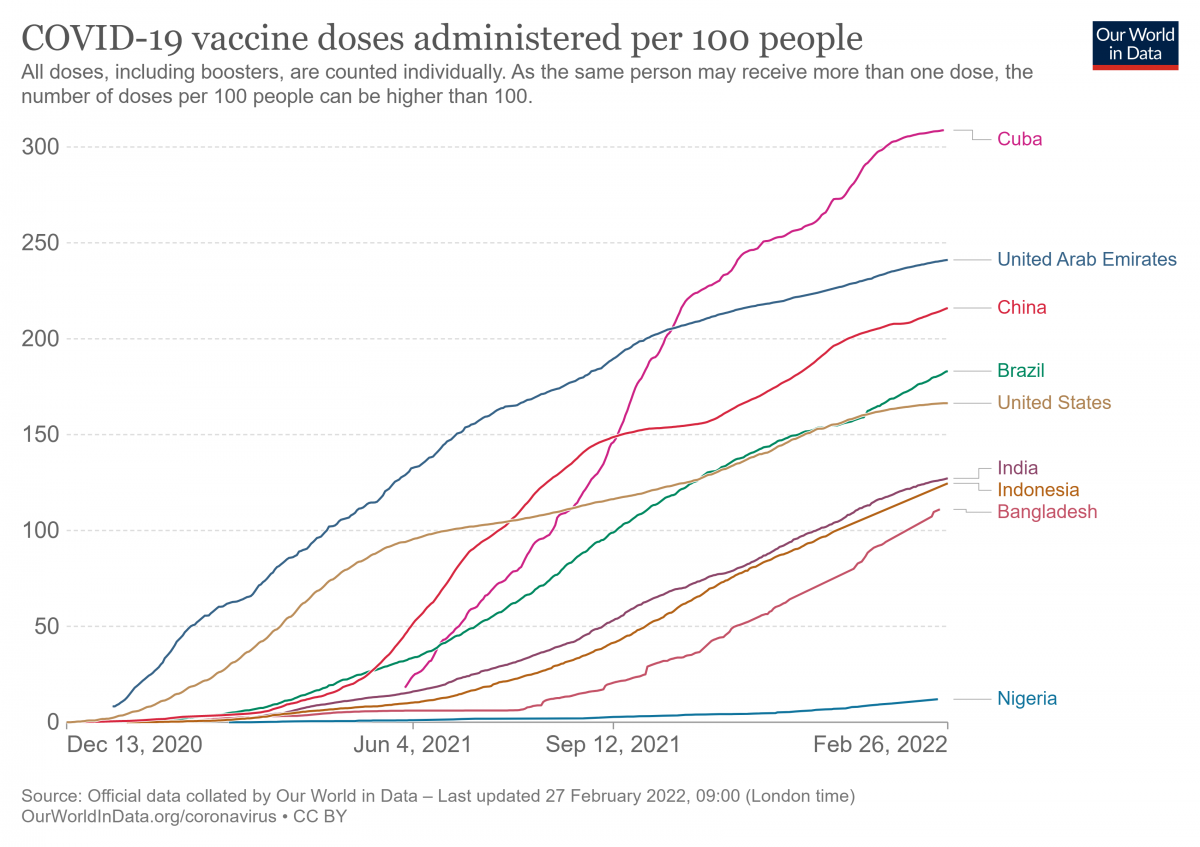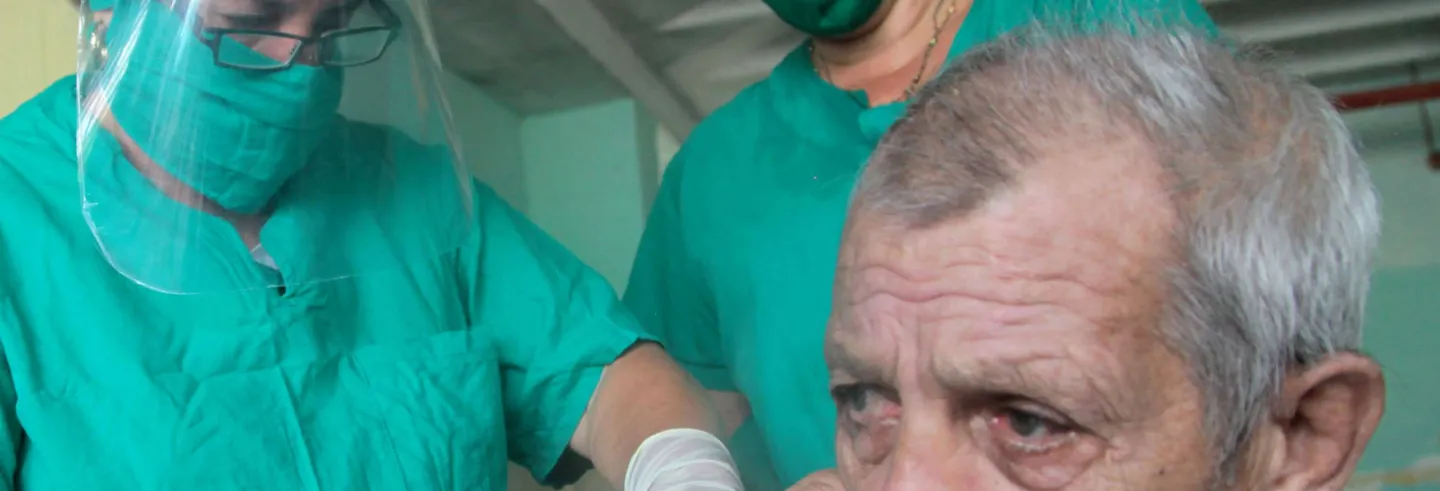Cuba recently announced plans to deliver as many as 200 million doses of its indigenously developed and tested Covid-19 vaccines to nations in the global South. Ironically, this year marks the 60th anniversary of the United States (US) embargo on Cuba, imposed by President John F. Kennedy in 1962. The six-decade-long embargo has been a drag on the country’s economy and affected livelihoods. It further had a severe effect on Cuba’s response to the pandemic, making it difficult for the nation to import critical medical equipment and supplies. But it also made the island more resilient in other ways.
Despite facing many difficulties on many fronts, the Caribbean country known for Che Guevara and revolution, Cohiba cigars and rum, now has to its credit, not one, but five Covid-19 vaccines, all indigenously developed and administered. According to the Cuban Health Ministry, by mid-February, 9.86 million Cubans, or 88.1% of the 11 million population, had been fully vaccinated with 34.7 million doses of locally produced vaccines. In addition to providing a third dose of vaccine to adults, most children between 2 and 18 have also been vaccinated. Cuba is the only country in the Latin America and Caribbean region to develop and produce vaccines against Covid-19. It ranks highest in the world when it comes to Covid-19 vaccine doses — 306.92 doses administered per 100 people. All vaccination on the island is voluntary.

The five Covid-19 vaccines that are produced and used in Cuba are Soberana 02, Abdala, Soberana 01, Soberana Plus, and Mambisa. Soberana 02 and Abdala are more than 90% effective, according to Cuban-run clinical trials last year. Their successful rollout brought infection rates down from among the highest in the Western hemisphere last summer to the low level it is today. Mambisa is a nasal vaccine. Unlike injectable vaccines, those administered by the nasal route stimulate local immunity in the nasal mucosa, site of entry of SARS-CoV-2, allowing early neutralisation of the Covid-19 pathogen. Soberana Plus is a booster vaccine.
Soberana is the Spanish word for sovereign, while Abdala is the title of a work by Cuban poet and National Hero José Marti. Mambisa is a word of African origin, and it is used to refer to the guerrillas who fought against Spanish colonialists in the 19th century. Soberana 01, Soberana 02, and Soberana Plus were developed at the Finlay Vaccine Institute in Havana. The others, Abdala and Mambisa, are from the Centre for Genetic Engineering and Biotechnology (CIGB), a major research institute, also in Havana.
While there were strict protocols for Covid-19 preventive behavioural measures, the main attention was soon on developing vaccines.
Cuba has a strong state apparatus to deliver welfare, and it won much praise early on for its handling of the Covid-19 pandemic by keeping the number of infections and deaths low in 2020. But this was short-lived due to many factors, including the need for people to go to work and buy daily necessities. The number of infected and hospitalised increased in 2021, necessitating stronger border controls and turning the focus to mass vaccinations. While there were strict protocols for Covid-19 preventive behavioural measures, the main attention was soon on developing vaccines.
Foundations of the biotech industry
One may wonder how a poor country such as Cuba, which has laboured under a US blockade for 60 years, managed to develop five Covid-19 vaccines. That too, in such a short time. It had not participated in the World Health Organisation (WHO)-led Covax vaccine sharing initiative. It had also not asked for handouts of Covid-19 vaccines from multinational pharmaceutical companies.
Cuba’s biotech industry’s achievements have resulted from both Fidel Castro’s vision and systematic planning over the years. The first Cuban multidisciplinary research centre, the National Centre for Scientific Research (CNIC), was founded in 1965. At the beginning of the 1980s, a proposal for developing a biotechnology strategy was put forward. In 1982, a Centre for Biological Research (CIB) was founded near Havana, and by 1986, the CIGB, with a staff of 1,080 opened its doors. The CIGB has commercialised 21 products internationally, including cancer immunotherapies, a hepatitis B vaccine, pesticides, and therapies for macular degeneration. It is now one of a cluster of 38 pharmaceutical and biotechnology establishments located on the west side of Havana, which have helped Cuba maintain its scientific and biotechnology innovations despite economic constraints.
Castro’s dedication to science was tested in 1991 after the break-up of the Soviet Union, which had substantially helped its communist ally. But biotechnology continued to do well with continued government support. In 1994, Cuba opened the Centre of Molecular Immunology (CIM) in Havana to develop vaccines and other biologicals such as cancer immunotherapies.
In a 2016 article in Nature magazine, Sara Reardon pointed out, “Unlike many of its Latin American peers, Cuba has had a stable government for decades, which has allowed the country to carry out long-term plans. And the country’s isolation from foreign aid spurred innovation in ways that few other low-income nations can claim. An often-heard verb is resolver— to fix problems, often on your own.”
Cuba’s biotech industry’s achievements have resulted from both Fidel Castro’s vision and systematic planning over the years.
Cuba’s vaccine clinical trial data has yet to undergo international scientific peer review. However, the country has had two virtual exchanges of information with the WHO to initiate the Emergency Use Listing process for its vaccines. Cuba’s vaccine test results are registered with the WHO, the Pan American Health Organisation (PAHO), and the Cuban government through its medicines regulatory authority, Centro para el Control Estatal de Medicamentos, Equipos y Dispositivos Médicos (CECMED).
Unlike vaccines from the US pharmaceutical giants, which use mRNA technology, Cuba’s vaccines are subunit protein vaccines — like the Indian-made Covovax vaccine. They use Cuba’s existing 'conjugate' vaccine technology. Scientists at the Finlay Vaccine Institute take a protein or some form of sugar from a bacterium or virus and chemically link it to a harmless fragment of a neurotoxin protein from the tetanus bacterium. The combination elicits a stronger immune response than either component alone. Conjugate vaccines against meningitis and typhoid are used worldwide, and Cuba has been immunising children with a vaccine of this type for years.
Trials of the vaccine showed recipients’ risk of symptomatic Covid-19 was reduced by 71%, compared with that of a placebo group of the same size — an efficacy similar to jabs made by Johnson & Johnson in New Jersey and AstraZeneca in Cambridge. Crucially for low-income countries, Cuba’s vaccines are cheap to produce, can be manufactured at scale, and do not require deep freezing.
Cuban vaccine research and production is fully government-financed, and various institutions in the country collaborate on projects, sharing resources and knowledge.
Cuba’s vaccine development and production is a matter of national pride. Universal healthcare and free education were the main pillars of reform after the 1959 revolution led by Castro and Che Guevara, himself a medical doctor. The island has demonstrated the strength of its health system nationally and globally over the years. According to a 2018 Time magazine report, life expectancy on the island is higher than in the US, and Cubans have more than three times as many doctors per capita.
More than 60 countries in the developing world have benefited from Cuban internationalism and solidarity expressed through Cuban doctors sent as medical brigades. They went to Haiti during the cholera outbreak that followed the 2010 earthquake, and they were in West Africa during the 2013–2016 Ebola crisis. The rapid manner in which Cuba sent health personnel in 2020 to Italy became a positive example of international health cooperation during the pandemic. Building on this experience, Cuban doctors and health specialists have become one of the most active forces in combating the pandemic nationally and globally.
With Covid-19, Cuba was aware that it would be almost impossible to buy vaccines on the international market due to the US embargo and a paucity of foreign currency. Starting in March 2020, with falling incomes because of the loss of tourism revenue and new US sanctions imposed under President Donald Trump, Cuba’s scientists decided it was time to take up the challenge of developing vaccines indigenously. They accomplished their goal admirably well. Cuban vaccine research and production is fully government-financed, and various institutions in the country collaborate on projects, sharing resources and knowledge. The aim is always to speed up progress from the research and innovation stage to that trials and application.
The island also shares its knowledge and technical know-how with other countries to help them manufacture the vaccines.
As Helen Yaffe of the University of Glasgow, who has studied the Cuban vaccination programmes, has put it:
Cuba is close to fully vaccinating its entire population, which means that future production of vaccines are for export. The Cubans say these will be provided at ‘solidarity prices’ [...] the poorest countries will receive donations, others will contribute towards the costs according to their capacity and others will pay more, enabling the Cubans to fund the whole process. Cuba is already exporting [its vaccines] and in talks with another 20 about the exports of vaccines. However, they are also offering technology transfers for countries with the domestic capacity to produce their vaccines, and assistance with public health delivery of the vaccines.
Cuba’s vaccines are being exported and, in some cases, donated. Countries that have benefited from them are Iran, Nicaragua, Venezuela, Vietnam, Syria, and St Vincent and the Grenadines. The island also shares its knowledge and technical know-how with other countries to help them manufacture the vaccines. In 2021, Cuba agreed to transfer its vaccine technology to Iran, then reeling under the pandemic. Finlay Vaccine Institute and Iran’s Pasteur Institute have collaborated on extensive Soberana 02 in Iran. The phase III clinical trial developed by Iran’s Pasteur Institute with Cuba’s Soberana 02 and Soberana Plus vaccines showed excellent results, reported the Finlay Vaccine Institute. Mexico is also looking for a vaccine partnership with Cuba, and many other developing countries have expressed their interest.
The WHO’s approval for the vaccines is expected soon, according to Rolando Pérez Rodríguez, director of science and innovation at Cuba’s state-run pharmaceutical conglomerate, BioCubaFarma. “We have formally requested the prequalification of one vaccine: Abdala,” Rodriguez told a press conference in Havana in January. The application for the WHO approval of a second Cuban vaccine, Soberana 02, will be sent in the coming weeks. It is also expected to gain authorisation for use this year, said Dagmar García Rivera, Director of Research at the Finlay Vaccine Institute.
Possible cooperation with India
Though the world’s largest producer of vaccines, India has found it difficult to roll out the many million doses required by its population and other developing countries. A collaboration with Cuba could produce a win-win situation, provided both parties are interested in taking quick decisions. Time is of the essence, and millions of lives could be saved in places and cultures where keeping a distance from each other is not an option. India and Cuba are fellow members of the non-aligned movement, with a long record of solidarity on a wide range of issues. A partnership between them to fast-track the production of vaccines could pave the way for the better global common good.
A memorandum of understanding (MoU) between India and Cuba on cooperation in health and medicine was signed in 2017 in New Delhi. It covers, among other things, pharmaceuticals and medical devices, professional training, and promotion of business development opportunities in pharmaceuticals and other areas. Last year, the CIGB and an Indian non-governmental organisation entered into a dialogue to supply vaccines to India and technology transfer to produce a Covid-19 vaccine in India, which could be made available to other developing nations.
While we need effective vaccines to prevent and arrest the spread of Covid-19, what is important is how we ensure their fair and equitable distribution and availability. According to the WHO, 87% of vaccine doses have gone to high or upper-middle-income countries, while only 8.3% of people from low-income countries have received at least one dose. Though at least 18 Covid-19 vaccines have been approved by the WHO or are in its evaluation process, vaccine distribution is still very low in many of the world’s poorest countries. It would cost US$50 billion to vaccinate 60% of the global population by mid-2022, pointed out International Monetary Fund (IMF) chief economist Gita Gopinath in a paper published in May 2021.
The large bilateral deals made between many high-income countries and vaccine producers by August 2020 undermined the Covid-19 Vaccines Global Access (COVAX) global vision of meeting the vaccine needs of developing countries. Many high-income countries purchased doses covering more than 100% of their populations, leaving COVAX with limited ability to procure sufficiently or negotiate prices. The high-income countries not only joined COVAX as self-financing participants but also secured direct access to early doses. This was before COVAX could raise sufficient funds from these same countries to cover its procurement and enter into contracts to lock in doses for lower-income participants.
An independent report from the WHO recommends that collaborations such as Covid-19 Tools Accelerator should continue to lead the global movement for an equitable response and maintain strong channels of coordination with complementary initiatives for procurement and financing. However, this is yet to become a reality, as seen in the case of lack of recognition and support for Cuban vaccines.
'These vaccines were funded by public money and should be first and foremost a global public good ...’
The pandemic has produced nine new billionaires in the US, Europe, and China. They have a combined worth of US$19.3 billion, enough to fully vaccinate 780 million people in low-income countries, according to campaigners for vaccine justice. “These billionaires are the human face of the huge profits many pharmaceutical corporations are making from the monopoly they hold on to these vaccines,” said Anne Marriott, Oxfam’s health policy manager. According to her, “These vaccines were funded by public money and should be first and foremost a global public good, not a private profit opportunity.” For instance, BioNTech received €325 million (US$397 million) from the German government for the development of the Pfizer-BioNTech vaccine.
Economist Jayati Gosh noted, “Though the companies producing the approved vaccines have benefited from public subsidies and publicly funded research, they nonetheless have taken advantage of patent protections to maintain a monopoly.” With just around 75% of the population fully vaccinated in India, there is an urgent need to immunise more people in all the states faster.
Recent reports indicate that Cuba may be able to obtain a loan of €46.7 million ($53.1 million) from the Central American Bank for Economic Integration to help bolster its Covid-19 vaccine programme. The best way out for all would be having patent-free vaccines that all countries do their part to distribute aggressively. If vaccines are to be made free and accessible to Indians, and if we are to demonstrate solidarity with the vaccine have-nots in developing counties, all avenues for vaccine production have to be explored, not just Anglo-American ones.










Cuba's miracle